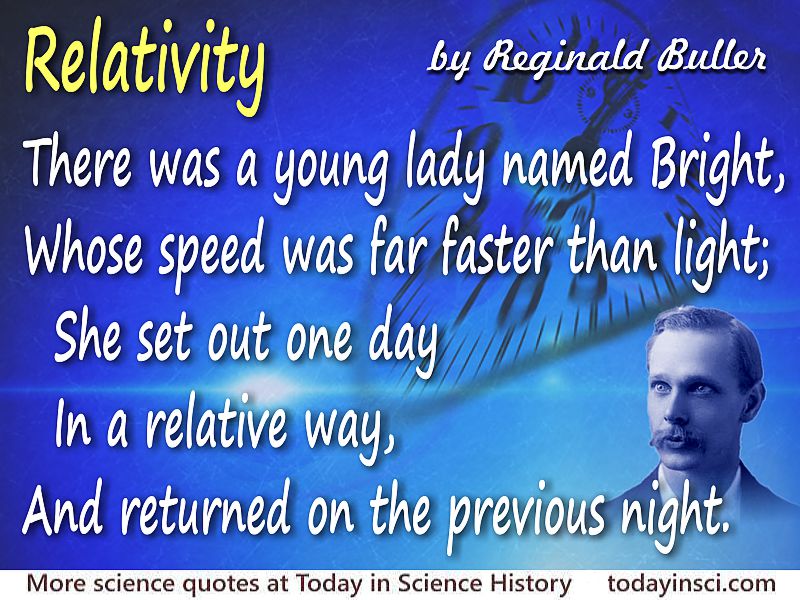 (source)
(source)
|
A. H. Reginald Buller
(19 Apr 1874 - 3 Jul 1944)
British-Canadian mycologist who wrote seven volumes of Researches in Fungi, Essays in Wheat and Practical Botany. He wrote limericks, of which, Relativity remains well-known.
|
A. H. Reginald Buller
“There was a young lady named Bright”
Illustrated Quote - Large (800 x 600 px)
Whose speed was far faster than light;
She set out one day
In a relative way,
And returned on the previous night.”
More A. H. Reginald Buller quotes on science >>
This limerick has an interesting history. It was first printed without attribution in the British magazine Punch in 1923, under with the title, “Relativity.” That such a topic was published in the popular press is an indication of how Albert Einstein’s theory of relativity held the public’s attention since it was first published in 1905. Also, the layperson had seen enough coverage in the media to know relativity affects time, and could understand the joke.
The humorous verse continued to be enjoyed as it was reprinted over the years and spread to America and Canada, by now around the world. But who was it’s originally anonymous author?
The answer was given, along with an interesting background of the origination of the verse, in the British newspaper, The Observer (14 Nov 1937).1 Having seen a version of the verse appear in that newspaper, A.H. Reginald Buller send a letter to the editor, claiming that he was the author of the now widespread limerick. Buller was a scientist, not a physicist, but whose field was mycology, the study of fungi.
In his letter, Buller explained that it resulted from a conversation about Einstein's theory with his physicist friend, Dr. G. A, Shakespear, while sitting in his garden. For amusement, Buller suggested they could each write a limerick. A few minutes later their lines were written.
A couple of years later, Buller recited his limerick at a scientific meeting, producing laughter, applause, and the attention of a reporter who suggested sending it to Punch magazine. Indeed, the magazine published the verse in the 19 Dec 1923 issue, for which Buller was paid a few shillings.
Buller penned a further verse a similar theme, that mass increases with velocity, according to Einstein’s special theory of relativity:2
“I have learned something new about matter:
My speed was so great,
Much increased was my weight,
Yet I failed to become any fatter!”
Since then, the original Relativity limerick has become so popular, it appears in such quote collections as The Yale Book of Quotations3 and Cassell’s Humorous Quotations, among others.
2 William S. Baring-Gould, The Lure of the Limerick: An Uninhibited History (1967), 6.
3 Fred R. Shapiro (ed.), The Yale Book of Quotations (2006), 113.
- Science Quotes by A. H. Reginald Buller.
- A. H. Reginald Buller - context of quote “There was a young lady named Bright” - Medium image (500 x 350 px)
- A. H. Reginald Buller - context of quote “To her friends said the Bright one in chatter” - Medium image (500 x 350 px)
- A. H. Reginald Buller - context of quote “To her friends said the Bright one in chatter” - Large image (800 x 600 px)







